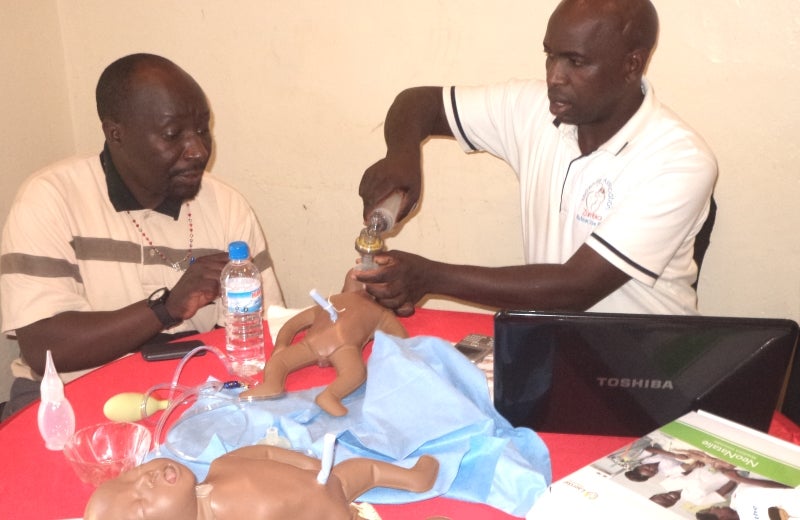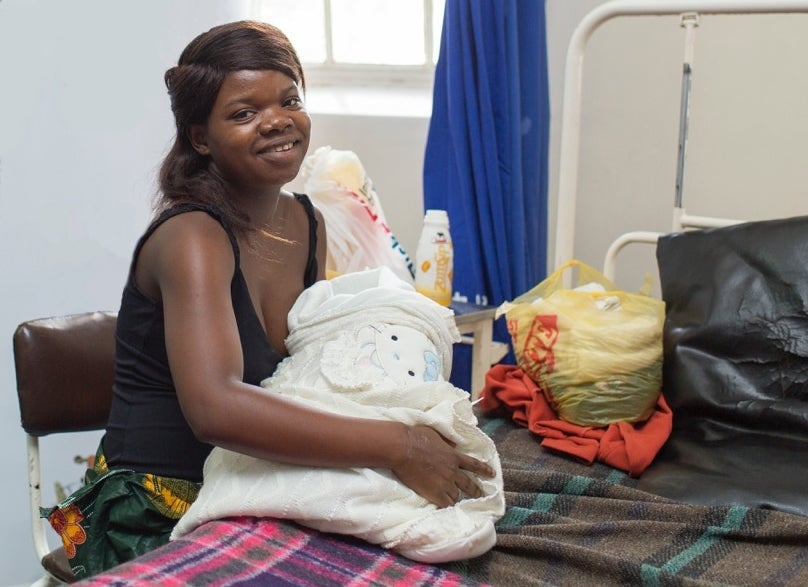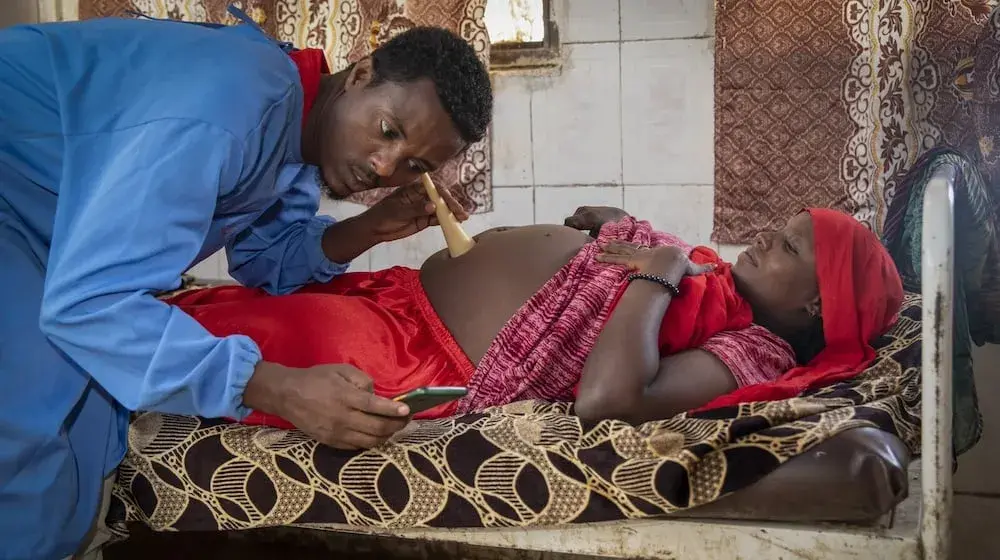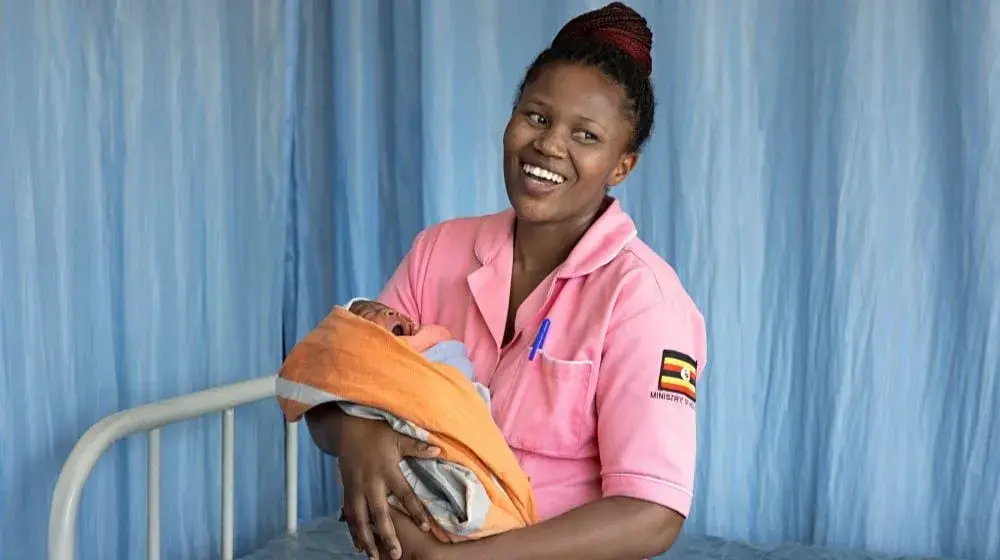CHAMA DISTRICT, Eastern Province, Zambia – Before Kingsley Musama became a midwife, he worked as a miner. Now he finds himself indispensible, routinely saving women's lives at Chikwa Rural Health Centre, which serves a remote area with a population catchment of 11,880.
As the only person skilled in this area at the clinic he makes himself available around the clock – and his day starts at 4 a.m. Every day, he faces serious challenges as he carries out his life-saving work, from lack of electricity to shortages of equipment, and lack of transport to get pregnant women to the nearest health facilities.
Yet he remains optimistic. “I would like to help as many women as possible, despite all the difficulties,” he says.
Tackling maternal health with innovation
A direct-entry male midwife, Mr. Musama has worked for the Ministry of Health for four years. As the only midwife in the area, he provides midwifery services to four other clinics as well. The enormity of his task has led him to think innovatively, to surmount the obstacles faced by women when it comes to their sexual and reproductive health.

“I work in a very remote and poor area, thus I came up with an initiative we call ‘community midwifery’ – we take midwifery services directly to the communities. This initiative has saved many women from dying due to pregnancy complications,” he says.
Other health care providers such as nurses and environmental health technicians are also involved in this initiative, assisted by community volunteers, as part of an outreach service.
In addition to midwifery services, he provides family planning counselling, breast cancer awareness and reproductive health education to women and their families. He has set up reproductive health focus groups at which he educates mothers on safe motherhood and encourages exclusive breastfeeding.
Mr. Musama also works with community-based volunteers, some of whom were supported by the UNFPA H6+ funded project and others through the Ministry of Health, to encourage women to deliver in health facilities and not at home.
His contributions have helped reduce the maternal and newborn mortality and morbidity levels in Chama District and Eastern Province as a whole. “I feel proud to be making a difference as a midwife,” he says. Mr. Musama's contributions have changed the lives of many families in his area. Couples, women and girls seek antenatal and postnatal consultations with him. He also advises couples on contraception and offers health education.
Zambia's total fertility rate was 5.3 children per woman. The Maternal Mortality Ratio (2014 DHS) was 398 deaths per 100,000 live births, down from an MMR of 591 deaths per 100,000 live births in 2007. To date, just over 3000 midwives’ posts have been filled; they serve a population of 14 million - leaving a shortfall of 49 per cent. Skilled birth attendance was at 64 per cent.
Making delivery safe for women
Mr. Musama’s working day is a busy one. “I start with conducting manual vacuum aspirations (MVAs) [from 4 a.m.] until 6 am. After that I attend to outpatient department (OPD) patients – about 85 to 90 patients until 2 p.m. From then onwards, I attend to maternal and child health (MCH), family planning, antenatal and postnatal clients.”

But safe delivery is his top priority. “If there is a woman who is about to deliver, I stop whatever I am doing and attend to her,” he says.
He would like to advance his midwifery education. “I have greatly benefited from Emergency Obstetric and Neonatal Care (EmONC) training under the H4+ Programme, which is jointly supported by UNFPA, UNICEF, WHO, UNAIDS and the World bank, and funded by CIDA. I have also benefited from several training programmes on Helping Babies Breathe under the Midwives Association of Zambia,” he says.
The Midwives Association of Zambia (MAZ) is implementing the ‘Helping Mothers Survive Bleeding and Helping Babies Breathe’ project under the International Confederation of Midwives (ICM). Mr. Musama has been trained by MAZ as a trainer.
In addition to training, Kingsley has been working at the health centre, which was one of the implementation sites under the H6+ funded RMNCH project in Chama District from 2012-2016.
He aims to reach and assist as many families as possible in his community, and to continue making a difference in their lives. And he encourages others – men, especially – to join the midwifery profession. Apart from making an important contribution to saving the lives of women and babies, this will dispel the myth that women prefer female midwives, he says.
By Precious Zandonda



